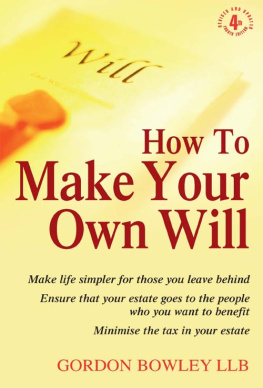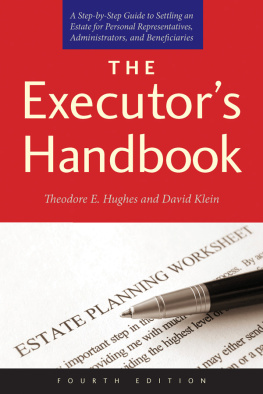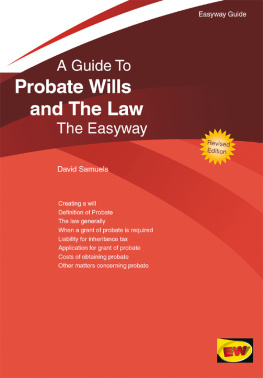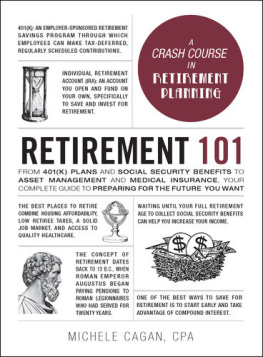Visit our How To website at www.howto.co.uk
At www.howto.co.uk you can engage in conversation with our authors all of whom have been there and done that in their specialist fields. You can get access to special offers and additional content but most importantly you will be able to engage with, and become a part of, a wide and growing community of people just like yourself.
At www.howto.co.uk youll be able to talk and share tips with people who have similar interests and are facing similar challenges in their lives. People who, just like you, have the desire to change their lives for the better be it through moving to a new country, starting a new business, growing their own vegetables, or writing a novel.
At www.howto.co.uk youll find the support and encouragement you need to help make your aspirations a reality.
You can go direct to www.probate-the-executors-guide.co.uk which is part of the main How To site.
How To Books strives to present authentic, inspiring, practical information in their books. Now, when you buy a title from How To Books, you get even more than just words on a page.
Contents
For over thirty years I practised as a family solicitor and was much engaged in winding up matters for people who had died. It became obvious to me that the majority of the cases I handled in these fields could have been dealt with by any reasonably intelligent layperson who had time available and a little professional guidance. Almost one third of cases passing through probate registries in England and Wales are personal applications for probate or letters of administration of an estate made by non-lawyers without professional assistance. It is a fact that in many solicitors offices, legal executives and their assistants do much of the work involved in dealing with the estates of those who have died. Of course there are other cases which require a great deal of legal knowledge and training, but these are the exceptional ones.
After retirement, I decided to write out for my wife Margaret and my son John, a step-by-step guide to the procedures to follow and the information that would be required to wind up my affairs without professional help when I die. Those writings became this work and I dedicate it to them as a token of my appreciation of the kindness and devotion that they have shown to me. I hope that both they and you will find it of use and a great moneysaver!
This book (which deals both with the cases where a will has been left and those where there is no valid will) is not intended to deal with every eventuality, but I believe it will cover what needs to be known in the majority of ordinary cases. It does not deal in detail with the calculation of inheritance tax, but if you decide to deal with an estate yourself rather than employ a solicitor, The Capital Taxes Office will calculate the tax for you. Throughout the book I have indicated where I consider professional assistance should be invoked. When deciding whether to deal with an estate yourself rather than hand it over to a solicitor, bear in mind that if you get stuck, you can always seek legal advice on a specific point or instruct a solicitor to handle a particular stage for example, you might wish to write all the letters and only ask the solicitor to prepare and lodge the probate forms. Such a course would reduce the cost considerably and I have included suitable specimen letters with relevant addresses in the appendices.
In spite of its limitations, I honestly think that this book includes all that it is necessary to know to enable the intelligent novice, with the necessary time available, to wind up most estates in England or Wales.
The book:
 aims to take a practical approach
aims to take a practical approach
 sets out the relevant law and procedure wherever possible in simple language without the use of legal terms and where legal terms are necessary explains them
sets out the relevant law and procedure wherever possible in simple language without the use of legal terms and where legal terms are necessary explains them
 ends each chapter with a summary or checklist of the principal points made in the chapter
ends each chapter with a summary or checklist of the principal points made in the chapter
 tells you when you need professional help
tells you when you need professional help
 contains sample letters which may be copied and used
contains sample letters which may be copied and used
 contains a list of useful addresses and
contains a list of useful addresses and
 is indexed to help you find what you want to know quickly.
is indexed to help you find what you want to know quickly.
I hope that it will prove to be of great assistance to readers in a period of their lives when I know many of them will be emotionally and frequently economically deeply troubled.
Go to it and good luck!
Authors notes
 This book only deals with the law applicable to England and Wales. Scottish law is different. Moreover, law and practice do change frequently and while every effort has been made to ensure that the contents of this short work are accurate and up to date, no responsibility is accepted for any loss resulting from acting, or from failure to act, as a result of it and the book is bought and sold on that basis.
This book only deals with the law applicable to England and Wales. Scottish law is different. Moreover, law and practice do change frequently and while every effort has been made to ensure that the contents of this short work are accurate and up to date, no responsibility is accepted for any loss resulting from acting, or from failure to act, as a result of it and the book is bought and sold on that basis.
 Throughout the book, for simplicitys sake and not for any reasons of gender prejudice, I have assumed that the usual case of the male of the species predeceasing the female will occur and he should be read as she or they where the context and circumstances so require.
Throughout the book, for simplicitys sake and not for any reasons of gender prejudice, I have assumed that the usual case of the male of the species predeceasing the female will occur and he should be read as she or they where the context and circumstances so require.
 Crown copyright is acknowledged in respect of all statutory and governmental material quoted or referred to in the text.
Crown copyright is acknowledged in respect of all statutory and governmental material quoted or referred to in the text.
What is Probate, When
is it Necessary, and
What is Involved?
S ORTING OUT THE LEGAL JARGON
It is self-evident that a person who has died cannot continue to manage his financial affairs and it is usually necessary for someone to be appointed and given legal authority to wind up matters for him. In law, the person who dies is called the deceased, the uncompleted financial matters are known as the estate and the person who is given the legal authority and duty to wind them up is called the legal personal representative or more shortly the personal representative. The document that proves the legal authority of the personal representative is called the grant of representation to the estate.
Grants of representation to an estate are obtained from an office of the High Court known as the probate registry and the process of obtaining a grant is commonly called probate, although strictly speaking probate should only be used to refer to proof that a will is legally valid and the document that proves its validity. If someone leaves a will but dies without appointing an executor to carry out the terms of his will or if all the executors appointed by the will are unable or unwilling to carry out the duties of an executor, the grant of representation obtained from the probate registry to prove that the will is a valid one and to authorise the person who obtains it to carry out its terms is more correctly called letters of administration of the estate with the will annexed. If someone dies without making a will, that person is said to die intestate and strictly speaking the grant of representation obtained from the probate registry to authorise someone to wind up his estate is known as letters of administration of the estate. Those to whom letters of administration or letters of administration with the will annexed are granted are known as the administrators of the estate.







 aims to take a practical approach
aims to take a practical approach